So, you just purchased a travel trailer and need to figure out where to park it between road trips when you’re not camping. As an RV owner, this can be a challenging question, mainly if you have limited space at home or are concerned about storing it on your property, such as in your driveway. Unfortunately, no answer applies to every situation, and the legality of parking a travel trailer in a driveway or front of the house can vary widely based on the local regulations and ordinances of the city, county, or homeowner’s association (HOA) where you live.
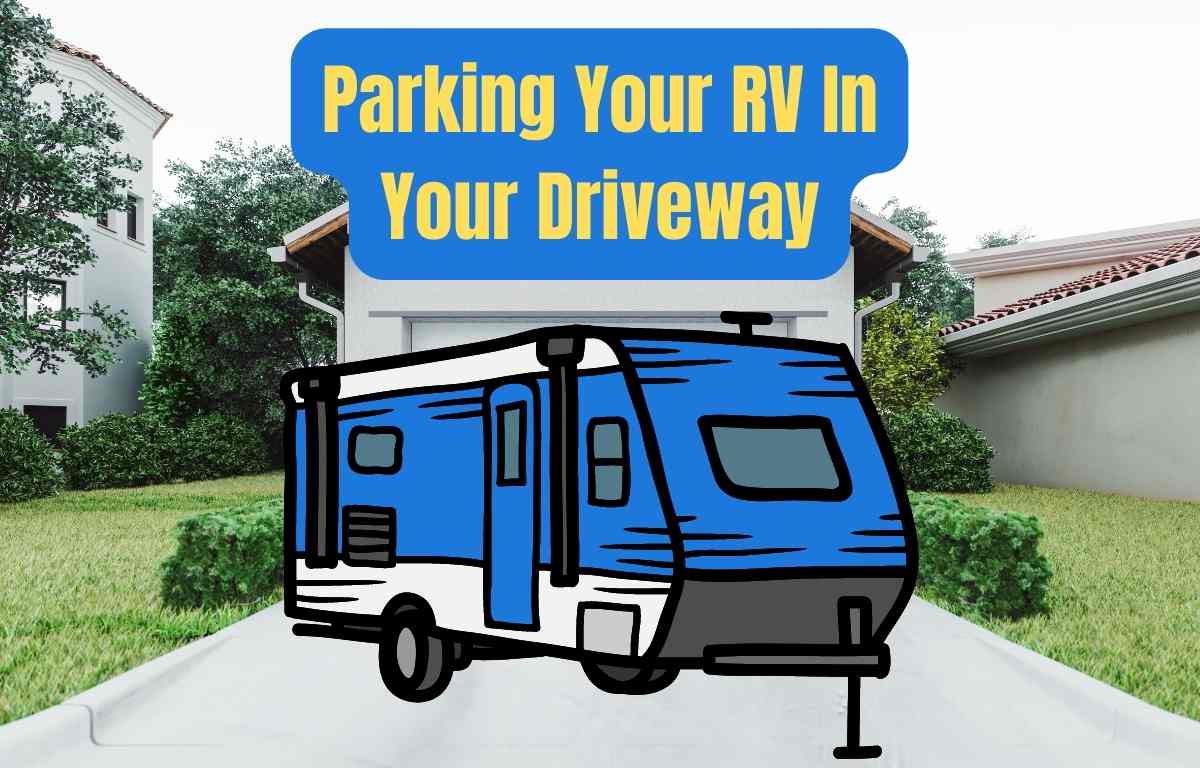
The good news is that you usually don’t have to guess and can find an answer quickly. However, the more rural your home is, the more likely you won’t run into any problems. Sometimes the most restrictive rules are in heavily populated areas or homes governed by Homeowner Associations. Also, while it’s possible to run into issues regarding parking your travel trailer in your driveway in a residential area, you may have other options, such as parking it in your rear yard, on the side of the house, or in other locations on your property.
To determine the legality in your area, you should:
- Identify Your Jurisdiction: Determine if you fall under city, town, county, or local municipality jurisdiction. If you’re in an HOA, check their rules as well.
- Visit the Official Website: Many jurisdictions have local ordinances available online. Look for sections on codes, ordinances, zoning, or planning on your city, county, or municipality’s website.
- Ask local officials or government office staff: A quick way to get an answer is usually to stop in the local town or municipal office or give them a call. If they don’t know the answer off the top of their head, they’ll usually find the answer and get back to you.
Additionally, observing your neighborhood to see if others park RVs or travel trailers and talking to neighbors can give you a general idea, but it’s always best to confirm with local laws to avoid code violations or legal issues.
How to find out if you can park your Travel Trailer in your driveway
If you want to get a general idea of the legality of travel trailer parking at your home, one good option is to drive around your neighborhood and see if other owners have RVs or travel trailers parked on their property. You may even want to talk with some of your neighbors with RVs and ask them if they know any rules or regulations governing RV parking.
While this may provide some direction, it’s always best to check your local laws and regulations to be sure. Below is a list of steps to help you find the correct answer so you’re not guessing and avoid any code violations or legal issues. Most laws governing issues related to this will be local or maybe county ordinances. You typically won’t find any state laws regulating RV parking.
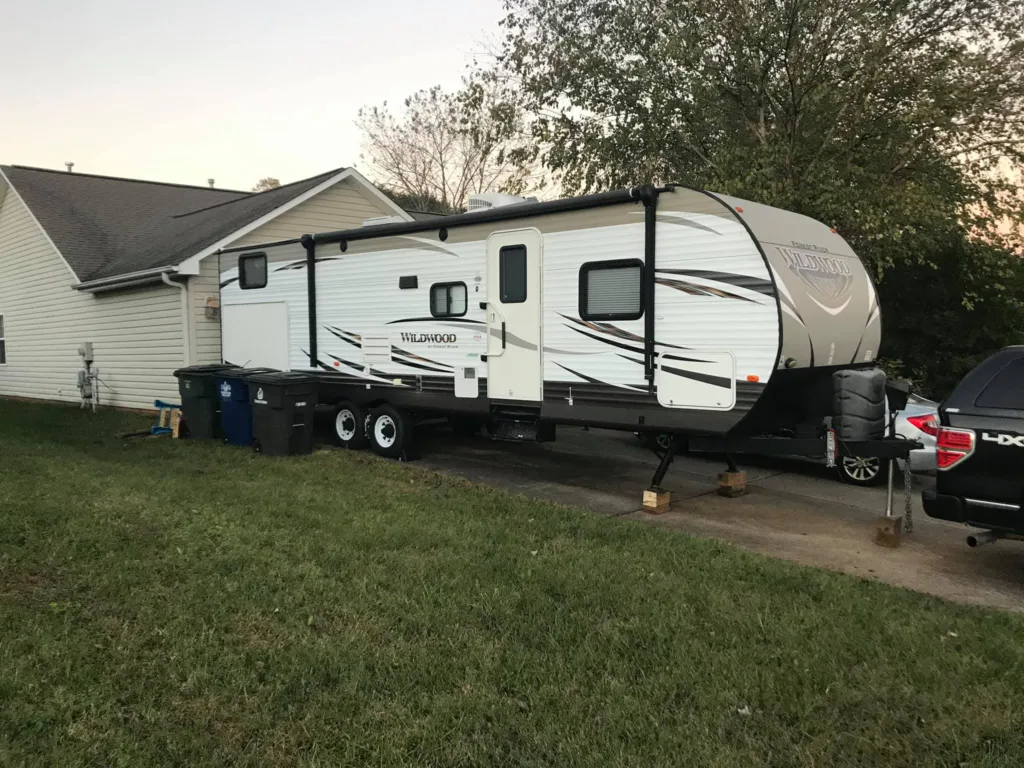
Finding local ordinances about parking an RV or travel trailer on your property generally requires a few steps. The process can vary depending on your local government’s accessibility and the resources they provide online. Here are some general steps to guide you:
- Identify Your Jurisdiction: The first thing to do is to identify the jurisdiction you fall under. This is typically your city, town, county, or local municipality. If you’re in a homeowner’s association (HOA), you’ll also need to look into their rules.
- Visit the Official Website: Many cities and municipalities have local ordinances available online. Go to the official website of your city, county, or municipality and look for a section on codes or ordinances. This is often under a section labeled “City Clerk,” “Code enforcement,” “Zoning,” “Planning,” or something similar.
- Search for Relevant Terms: Once you find the section that holds the local codes or ordinances, use the website’s search function (if available) to search for terms like “RV,” “recreational vehicle,” “travel trailer,” “vehicle parking,” or “parking regulations.” You may also need to review sections on residential zoning and property restrictions related to RV parking on residential property.
- Contact Local Government Offices: If you cannot find the information online, or if it’s unclear, contact your local government offices directly. This could be your city hall, county clerk’s office, city officials, or local zoning/planning office. Ask them for information about the regulations concerning parking an RV on private property.
- Check with Your HOA: If you’re part of a Homeowners Association, also check the association’s rules. They may have additional restrictions beyond what the city or county requires. These rules regularly apply to RVs, motor homes, boats, or even utility trailers.
Some cities and counties have ordinances restricting the parking of travel trailers, RVs, or other large vehicles on residential lots for extended periods. These regulations can also dictate how such vehicles are stored or parked. For instance, some ordinances may require the vehicle to be parked behind a fence or other visual barrier to keep it out of public view. It may also dictate a specific time limit for RV parking.
Similarly, if you live in a neighborhood with a Homeowners Association, the HOA rules may include restrictions on RV driveway parking. Some HOAs may not allow such vehicles to be parked in driveways at all, while others may allow it under specific conditions or limit the time you can park it there, such as no longer than X consecutive days.
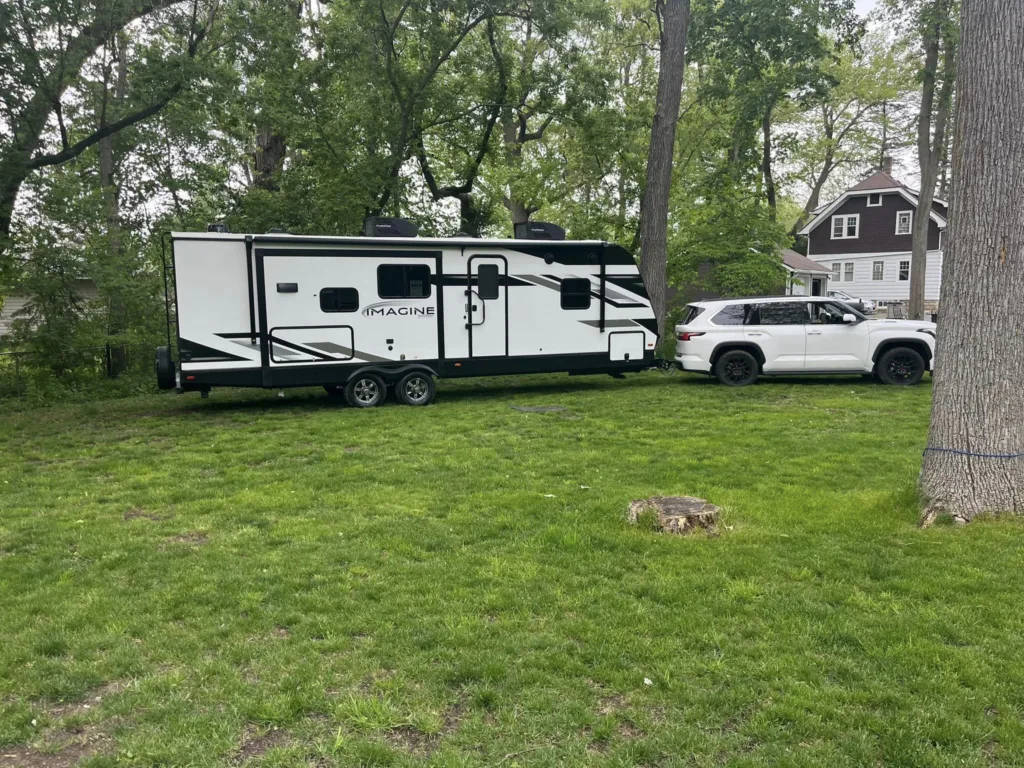
The other thing to consider is your relationship with your neighbors. While this may not be a legal concern, some neighbors may complain or create a less-than-ideal relationship if they’re annoyed by having a large trailer next to their house. It’s not required, but it could be a good idea to talk with your neighbors before parking your travel trailer in an area that may have a negative impact on their enjoyment of their property and help you maintain good relationships with your neighbor.
Where can you park your travel trailer at home?
Parking an RV at home will depend on a few factors, including your local zoning laws and homeowner association rules, as well as the physical constraints of your property. Here are some common options:
- Driveway: This is often the most straightforward choice if your RV fits comfortably and doesn’t obstruct sidewalks or the road.
- RV Pad: Some homeowners opt for constructing a separate RV pad on their property, often alongside the house. This can be especially useful if the driveway is not an option due to space constraints or if you want a dedicated space for the RV. While it may cost some upfront money, creating dedicated RV parking spaces is often the better option and may allow you to run eclectic and water lines so you can enjoy your RV at home and use it as a guest house for a family member that is coming for a short visit. Just check to ensure you are allowed to park the RV in the location you plan to build the RV pad. While some will create a concrete pad, many will simply construct one out of crushed stone.
- Side Yard: If you have a narrow piece of property on the side of your home, this may be a great place to park your travel trailer. The size and length of your RV will dictate this.
- Backyard: Sometimes, you might park your RV in your backyard. This can offer better security and more discretion. However, it might require a sizeable gate and an absence of low-hanging power lines or tree branches. The power company will likely hold you responsible for any damage.
- Garage: If you have a large enough garage or your RV is relatively small, storing it in the garage can offer the best protection from the elements.
- Carport or RV Cover: An RV-specific carport or cover can provide some protection from the weather while parked at your home.
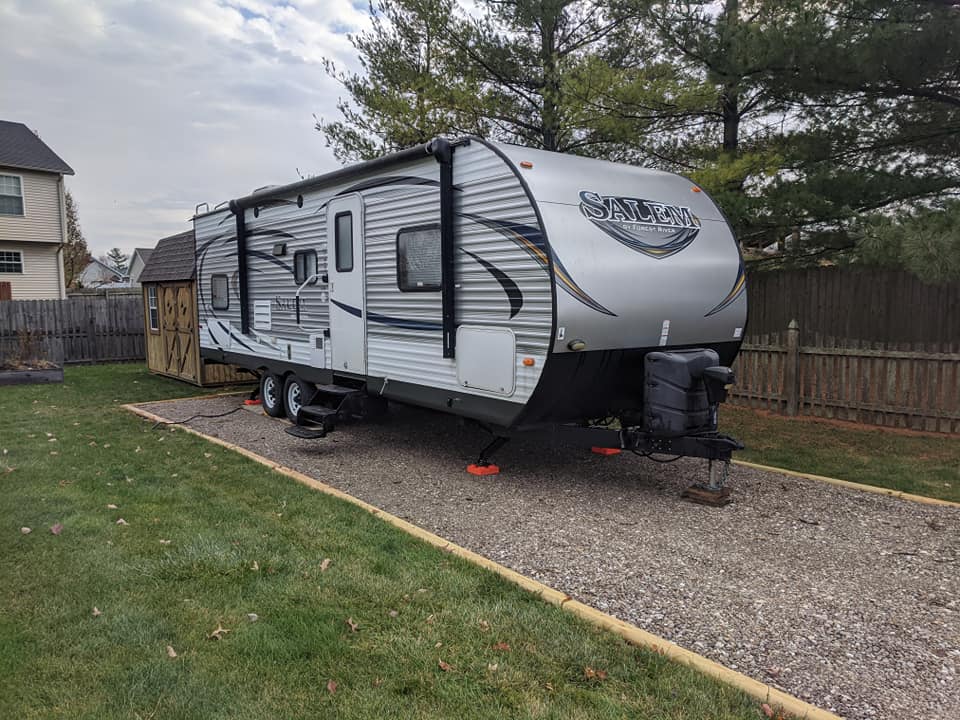
Before deciding on any of these options, it’s essential to check your local ordinances and HOA rules (if applicable). Some areas have strict rules on RV parking, mainly if the vehicle is visible from the street. Also, ensure that parking your RV at home won’t obstruct drivers’ visibility in your neighborhood or pose any other safety risks.
How to determine if you have enough room to park your travel trailer at home?
Size Considerations: The dimensions of your RV, particularly its length, can influence whether it can comfortably sit in your driveway. Local laws often prohibit RVs from spilling onto the sidewalk to maintain safe passage for pedestrians. After all, the sidewalk is generally a public thoroughfare, and impeding it is typically not permissible. If you are parking your RV in your driveway, ensure you have enough length so the entire trailer fits on your property.
Happy Home and Happy Neighbors: The size of your travel trailer could take up a lot of your driveway space or become a nuisance to your or your neighbor’s enjoyment of their homes. If your travel trailer is so large that it precludes the option of parking a second vehicle in your driveway, storing it at home for an extended period of time is inconvenient. Furthermore, if your RV infringes upon your neighbor’s property, this could lead to conflicts. The last thing you want to do is create a bad relationship with your neighbor because of your RV.
Clearance: While there are usually no legal constraints related to the height of an RV, it is crucial to be mindful of overhead utilities like telephone or power lines. Sometimes utility lines are lower near the house than on the residential streets, so ensure you have enough clearance before backing it into your driveway. Striking these lines could be costly and potentially dangerous.
Driveway Grade: The incline of your driveway is a factor that requires your attention, especially if it isn’t very level. If your driveway has a steep slope, your RV’s rear bumper might scrape the ground when backing it into or out of your driveway. Additionally, if the curb is excessively steep, you might require ramps for smooth access. You’ll also need to securely chock your tires to prevent the RV from rolling if your driveway slope is too steep.
Where else can you park your travel trailer other than at home?
If you can’t, or prefer not to, store your RV at home, several alternatives are available. Below are a few options:
- RV Storage Facility: Many cities and towns have storage facilities specifically designed for RVs and oversized vehicles. These RV storage units can provide a safe and secure location to store your travel trailer when it’s not in use. Some of these facilities offer covered, uncovered, and indoor storage options.
- Self-Storage Facilities: Some general self-storage facilities have spaces large enough to accommodate RVs. This could be an enclosed unit or a dedicated outdoor parking space.
- RV Parks and Campgrounds: Some RV parks and campgrounds offer long-term storage options. This could be useful if you frequent a specific campground and don’t want to haul your RV back and forth.
- Renting a Private Space: Sometimes, individuals with large properties may be willing to rent out a portion of their land for RV storage. You may even find individuals renting out space on their property on sites like Craiglist or Facebook Marketplace. If you have a local community forum, you can even post a request for a space there, and someone suggests an option, sometimes for a much more affordable price than a commercial storage facility.
- Indoor RV Storage: For the highest level of protection from the elements but at a higher cost, indoor RV storage facilities are available in some areas. During the off-season, some facilities like fairgrounds may offer indoor (and outdoor) RV storage.
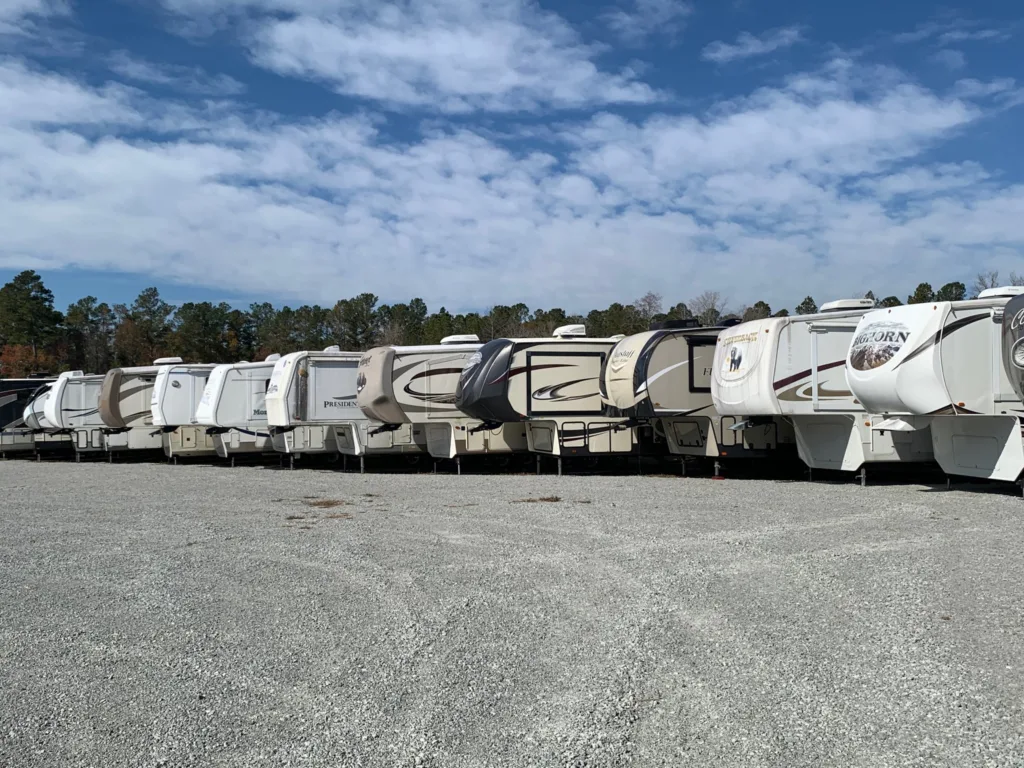
When choosing an RV storage option, it’s essential to consider factors such as cost, security, accessibility, and the level of protection from the weather. Always research and compare options before deciding on the best storage solution.
Can you park a travel trailer on public streets?
Parking an RV on city streets depends heavily on local laws and regulations, varying wildly from one city or town to the next. In many places, parking an RV on a public roadway is prohibited entirely or allowed only under certain conditions or for limited periods of time. For instance, some cities may permit RV parking during daylight hours but not overnight. Others may have specific streets where RV parking is allowed or restricted.
Additionally, there are often restrictions related to safety and traffic flow. Due to their size, RVs can obstruct sightlines or impede traffic, which can be a safety issue. Lastly, even if parking is allowed, there are often rules to prevent people from living or camping in an RV while parked on the street.
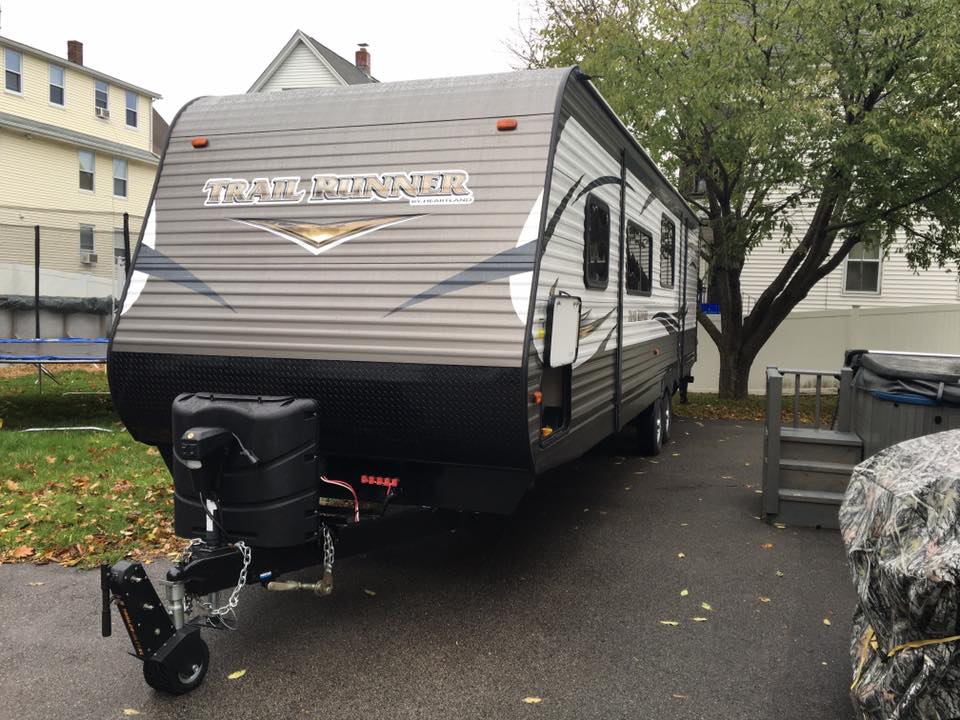
In any case, it’s essential to check with local authorities or your city’s Department of Transportation to understand the specific regulations for RV parking in your area. Violating these rules could result in fines or other penalties.
Conclusion
Parking your RV at home is a great way to save money and avoid the hassle of finding a facility or storage lot. However, it’s important to be aware of any local regulations or ordinances that may restrict parking your RV at home. While most rural areas will be much more lenient, some towns, cities, counties, or homeowners of neighborhood associations may have rules that will limit the parking of recreational vehicles in driveways, on city streets, or in other areas in front of your house. As an alternative, you may need to find another space on your property to park your RV or look to store it offsite.
Also, while you may be able to legally park your RV at home, there may be additional rules about using it at home, especially if you are doing so as temporary housing or plan to stay in it for an extended period of time. You will also need to ensure you have enough space to store it safely and that it won’t impact your use of your property or create issues with your neighbors. The size of your RV will likely be a limiting factor dictating where you can park it. This is especially true if the length of your RV is longer than your driveway.
The most restrictive rules will relate to parking your RV on a public street. Some localities will permit you to park it along the roadway for a certain amount of time, but many towns will have enforceable laws to prevent long-term RV parking.
While parking and storing an RV can be challenging for some, it’s a part of RV life that RV owners need to contend with. The good news is that there are usually plenty of options available if you can’t store it in your driveway. Good luck, and don’t hesitate to leave a comment if you have any questions. I hope to see you on the road!
